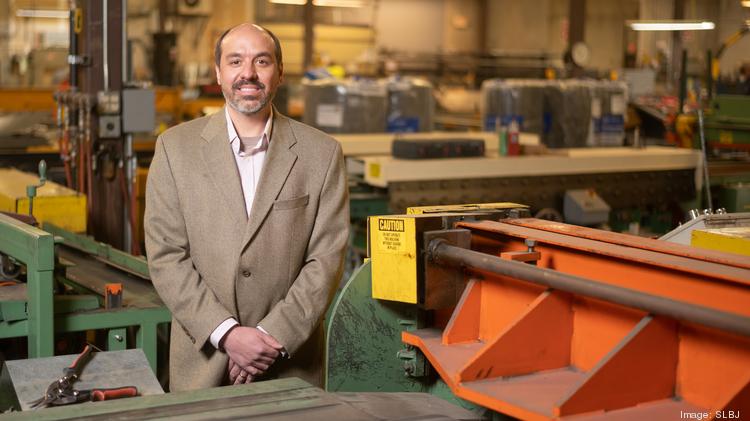Kurt Voss, vice president of engineering for Integrated Facility Services, said NPBI will be a valuable line of business after the pandemic subsides.
Integrated Facility Services Inc. in June installed new air purification technology at its Fenton headquarters — effectively putting money where its mouth is.
The Covid-19 pandemic was raging and nerves were high as to how to make buildings’ air quality safer. Leaders at IFS, a full-service mechanical contractor, recognized an opportunity in needlepoint bipolar ionization technology installation (NPBI).
That technology can produce ions that target and neutralize contaminants in the air through a building’s HVAC system. The NPBI uses relatively low energy — as low as 5 watts in some cases — is low-maintenance and isn’t cost prohibitive, said IFS Vice President of Engineering Kurt Voss.
“We started looking at the best way to still keep energy consumption in check while trying to improve the health of the building,” Voss said. “We started talking with our customers about (the technology), and we said ‘if this is a product that we believe in, then we need to put it in our own office to not only say that we truly do believe in it, but that we’re going to spend our own money on it.'”
Since June, IFS has added $2 million, more than 2.5% of its total revenue, to its bottom line thanks to NPBI. The company has installed the technology at numerous school districts and several buildings (Voss declined to disclose exactly who), and IFS has one employee solely dedicated to selling the service to clients. And, Voss added, it’s not technology that will become useless once the pandemic ends, providing a sustainable solution for clients and an ongoing line of business for IFS.
“I think our amount of work has been more than in past years,” Voss said. “When the pandemic started, and everything shut down, surprisingly enough a lot of the businesses and schools have taken advantage of that time that people aren’t in the building.”
A clean beginning
Founded in 1966 by Bill Rundquist, IFS is one of the St. Louis region’s largest mechanical contractors with nearly $72 million in 2019 revenue. It has over 200 employees and is led by John Rundquist, the second-generation leader. In addition to its HVAC work, IFS also specializes in plumbing, building automation, fire protection and more.
The company has relied on those specialties to help owners and occupiers improve buildings for people. For example, IFS has conducted water sampling for Legionella and other contaminants associated with underused plumbing systems; installed touchless fixtures; and restroom retrofits.
“We have done a lot of going into buildings and flushing the entire building, where we drain the building or run fresh water through it. We’ve gone through and inspected and cleaned ice machines, water coolers, dishwashers — anything where water could potentially sit is a spot where this bacteria can grow,” Voss said. “I don’t think people think about that, you know, what happens if I go and get a drink of water out of a faucet that’s stagnant for nine months.”
With more clients looking to make their buildings safer during the pandemic, IFS officials were able to create custom solutions — including NPBI — for their needs.
Pandemic potential
Company officials say Covid-19 has created a new business segment with untapped potential. However, there are questions about the effectiveness of the technology.
The technology has existed in the U.S. since the 1970s and was used against SARS in 2004 and more recent outbreaks of MERS, norovirus and various strains of influenza, according to Business Insider.
But the technology has no scientific peer-reviewed studies regarding its efficacy. Industry advocacy group American Society of Heating, Refrigerating and Air-Conditioning Engineers (ASHRAE) also has no formal position regarding the technology. Further, a May article from ASHRAE Journal stated social distancing, surface cleaning and disinfection, handwashing and other strategies of good hygiene “are far more important than anything related to the HVAC system” for non-health care properties.
IFS uses tech developed by Charlotte, North Carolina-based Global Plasma Solutions. Despite the lack of independent testing of the technology, the company counts the White House, Google, Harvard University and Mayo Clinic among its users. Falfurrias Capital Partners, a private equity firm co-founded by former Bank of America CEO Hugh McColl, invested in Global Plasma Solutions in 2018, according to affiliated publication Charlotte Business Journal.
In early March, Global Plasma Solutions appointed its first-ever chief science officer, Edward Sobek, who will oversee the company’s efforts to have the tech evaluated in applied research and testing. The company is hopeful testing will establish NPBI as “a unique and leading technology” in indoor air quality, according to a release.
Voss and IFS believe it’s just a matter of time before tests emerge that validate NPBI.
“I really think that it’s going to show that (schools and businesses) are a much better environment. Anything we could do to try and mitigate (germs) is huge for the economy,” he said.
More about Integrated Facility Services Inc.
Founded: 1966
Headquarters: Fenton
Top executive: John Rundquist, president
Employees: More than 200
Revenue: About $72 million
What it does: Mechanical contracting, facility solutions and HVAC service provider
